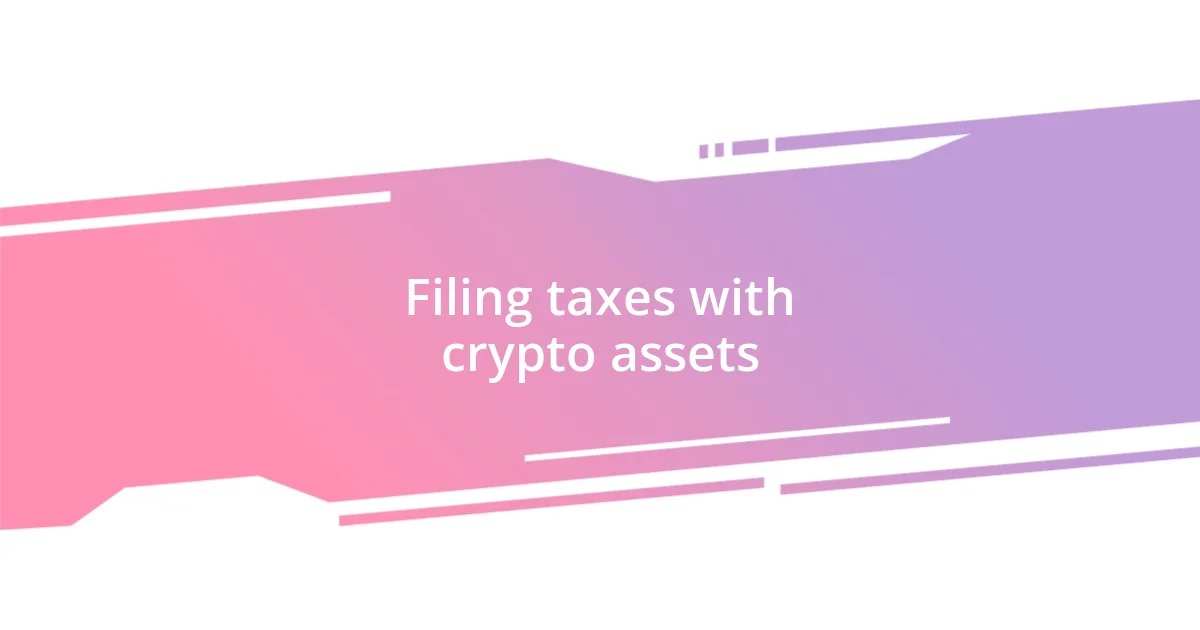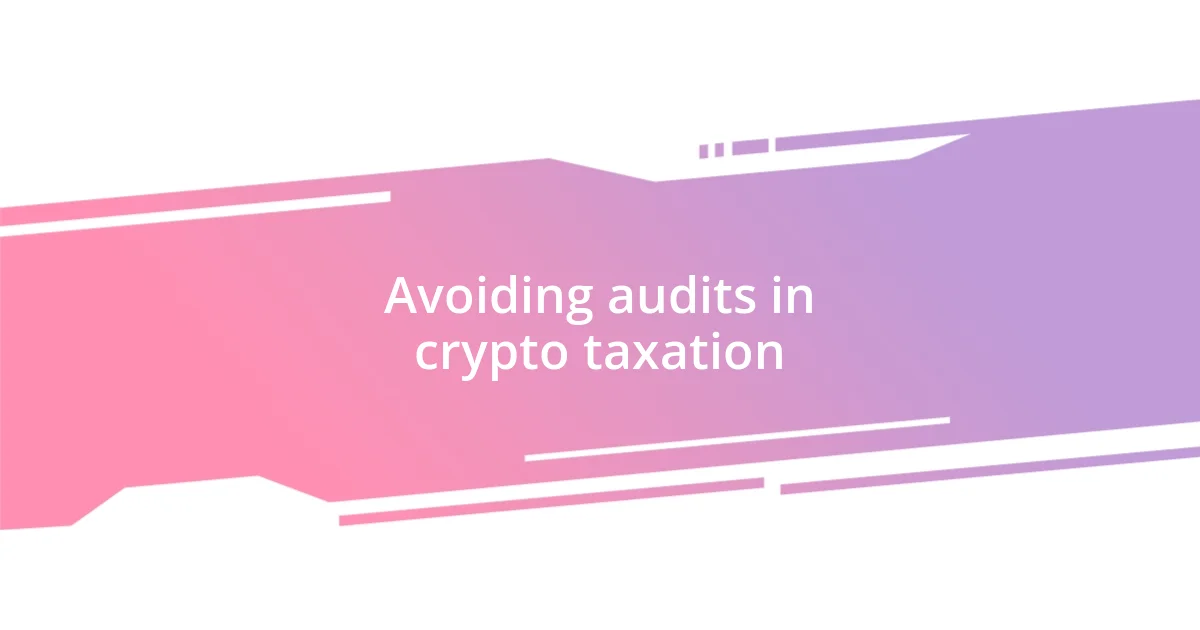Key takeaways:
- Crytpocurrencies are treated as property for tax purposes, making it essential to track transactions to accurately report capital gains and losses.
- Utilizing dedicated crypto tracking tools and maintaining organized records can significantly reduce stress and improve accuracy during tax filing.
- Understand local tax laws and the potential deductions available, such as transaction fees and losses, to optimize your overall tax strategy.

Understanding crypto taxation basics
Crypto taxation can be a real puzzle for many. I remember the first time I received a notification about reporting crypto gains—it felt overwhelming! Yet, at its core, understanding that cryptocurrencies are classified as property for tax purposes is foundational. This means that when you sell, trade, or use your digital assets, you might trigger capital gains taxes, just like selling stocks.
When I first delved into this topic, I realized the significance of tracking every transaction. Can you imagine sorting through your trades to find the right basis for your gains? It’s a lot! Yet, I found that by using specific apps designed for crypto tracking, not only did my stress lessen, but I could also see exactly how my investments were performing. It was liberating to have a clear picture, and it made tax time feel less daunting.
Additionally, I think it’s crucial for all crypto investors to be aware of the difference between short-term and long-term capital gains. Have you ever held onto an asset for over a year? That’s where tax benefits can come into play. Long-term gains are typically taxed at a reduced rate, which is a small reward for patience. Understanding these basics can really shape your investment strategy, making it not just about the potential gains, but also about the smart planning that goes hand in hand.

Key principles for crypto reporting
Keeping track of crypto transactions can feel daunting, especially when you’ve been trading frequently. I’ve definitely felt the pressure at tax time when I realized just how many trades I had made in the past year. It quickly became clear that a methodical approach to reporting was essential. Accurate reporting not only helps ensure compliance but can also foster a deeper understanding of my investment performance.
Here are some key principles for effective crypto reporting:
– Documentation is essential: Always keep records of every transaction, including dates, amounts, and values. This has saved me countless hours and headaches.
– Use reliable tools: I can’t stress enough the importance of leveraging apps designed for crypto tracking. They simplify categorization and automate calculations, which has been a game-changer for me.
– Understand your local tax laws: I had to familiarize myself with regulations in my jurisdiction, which varies from place to place. Misinformation can lead to costly mistakes.
– Calculate gains accurately: Knowing how to determine your cost basis for every transaction is key. I learned the hard way that overlooking this can lead to unexpected tax liabilities.
– Stay updated: The crypto landscape is dynamic, and tax regulations can shift. Subscribing to relevant newsletters has kept me informed and prepared, reducing last-minute scrambles.
These practices not only bring clarity to the reporting process but also reduce the stress associated with tax season.

Strategies to track cryptocurrency transactions
Tracking cryptocurrency transactions can be a real challenge, but I’ve discovered a few strategies that make it more manageable. For instance, when I first started, I relied heavily on spreadsheets. However, as my trading volume increased, I realized that managing everything through Excel was becoming overwhelming. Transitioning to specialized crypto tracking tools greatly reduced my stress and allowed me to easily visualize my portfolio’s performance. It felt like a weight lifted off my shoulders!
Another effective method I’ve implemented is integrating exchanges with automated tracking solutions. I had a couple of scary moments where I forgot to log a sale and worried about missing out on crucial data. Using APIs to link my exchange accounts directly to tracking software has significantly cut down on manual entry and the potential for errors. Now, each transaction flows seamlessly into my records, which not only saves time but provides a more accurate picture of my activity.
Ultimately, I can’t stress enough how vital it is to stay organized and proactive. After a few tax seasons filled with panic and late-night computing, I learned to implement regular check-ins to ensure my logs are accurate and up-to-date. This practice has provided peace of mind and made tax filing feel like a breeze rather than a last-minute scramble.
| Strategy | Description |
|---|---|
| Spreadsheets | Great for small volumes; however, can become cumbersome with increased activity. |
| Automated Tracking Apps | Minimizes manual entry; provides real-time data visualization and portfolio performance. |
| API Integration | Links exchanges directly to tracking tools for seamless transaction logging. |
| Regular Check-ins | Keeps your records updated and reduces anxiety during tax season. |

Common deductions for crypto investors
It’s incredible how many deductions crypto investors can take advantage of. For example, I learned that transaction fees can be deducted, which helps lessen my tax burden when I’m making frequent trades. Every little bit helps, right? I remember feeling relieved when I realized I could include those exchange fees as part of my costs.
Another deduction that surprised me was the ability to write off losses from crypto investments. If you’ve ever weathered a dip in the market, you know how painful that can be. But learning about tax-loss harvesting turned my losses into potential tax savings, easing the sting a bit. By strategically selling a losing investment, I could offset capital gains and lower my taxable income, which felt like a small victory amidst the chaos.
Moreover, if you’re engaging in trading as a business rather than as a hobby, it opens up doors for additional deductions. I found it enlightening to know that expenses related to running my trading activities, such as education costs for courses or software for trading, might also be eligible. Have you considered what expenses you’ve incurred in your trading journey? Turning those into deductions can significantly impact your overall tax scenario, turning a headache into a more manageable situation.

Tax implications of trading crypto
When it comes to trading crypto, the tax implications can be far-reaching. I remember my first significant trade when the realization hit me that each transaction could have tax consequences. The thought of tracking gains, losses, and the holding period for every asset I bought and sold felt overwhelming initially. It’s essential to understand that the IRS treats cryptocurrencies as property, which means any sale or trade can result in capital gains or losses. This framework can add complexity, especially during periods of high volatility.
Another thing that struck me early on is the importance of keeping accurate records. I had a few panic-inducing moments during tax season when I couldn’t remember the specifics of a transaction I made months earlier. This realization led me to focus on maintaining detailed logs of my trades, including dates, amounts, and market values at the time of each transaction. This diligence not only made filing taxes easier but also minimized my anxiety during what can be a stressful time for many traders.
It’s fascinating how a proactive approach can turn tax filing into less of a chore. For instance, I found that regularly reviewing my trading activity helped me stay on top of any potential tax implications. Now, rather than treating tax season like a last-minute project, I view it as a natural part of my trading life. But have you considered how enhancing your tracking can impact your overall tax strategy? Embracing these practices can mean the difference between a chaotic scramble and a smooth filing process, allowing you to focus on what you love—trading!

Filing taxes with crypto assets
Filing taxes with crypto assets can feel like navigating a maze, especially when you consider the unique requirements involved. I remember the first time I faced tax season after engaging in crypto trading; it was a mix of confusion and excitement. Each transaction felt like it came with its own set of rules, and I quickly learned the importance of organizing my records meticulously. Without clear documentation of gains and losses, the process can spiral into a taxing headache.
One aspect I’ve come to appreciate is the benefit of using software tools to streamline tax filing. Initially, I relied on spreadsheets, but I discovered that dedicated crypto tax software could effortlessly integrate with my trading accounts. This not only saved me time but significantly reduced the stress I felt during filing. Isn’t it amazing how technology can ease a traditionally burdensome task? Now, rather than dreading paperwork, I embrace the efficiency these tools provide, turning what once felt insurmountable into an attainable goal.
Additionally, I’ve realized how crucial it is to stay updated on tax laws related to cryptocurrency. I often reflect on how much things can change year to year, and I learned this firsthand when I missed a significant tax rule during my early trading days. It was a wake-up call to keep informed through reliable sources and consult professionals when needed. Have you thought about how a little extra effort in understanding tax regulations could save you mountains of stress in the long run? Embracing this proactive mindset has transformed my approach to tax filing from a dreaded chore into a manageable responsibility.

Avoiding audits in crypto taxation
Maintaining clear records is essential for avoiding audits in crypto taxation. I once experienced a terrifying moment when the IRS sent me a letter asking for clarification on a transaction I couldn’t fully recall. Since that day, I’ve made it my mission to document every penny spent, from the exchanges used to the exact times of trades. Keeping this level of detail not only protects me but provides peace of mind, knowing I have everything organized if questions arise.
Another strategy I’ve adopted is double-checking my tax returns before filing. There’s something satisfying about running my numbers through a couple of software tools to ensure they match. Initially, I fell into the trap of assuming my first draft was perfect, only to discover errors later. Have you ever had one of those “uh-oh” moments? Now, by verifying all my figures, I feel more confident, which is vital when you consider the audits that can arise from discrepancies.
Lastly, I find that being open and transparent with my transactions is key to avoiding pitfalls. I remember a friend who tried to hide gains, thinking he could minimize his tax burden. The stress of that choice led to a costly audit. Embracing honesty in my reporting feels like a weight lifted off my shoulders. Have you pondered how transparency in your dealings can safeguard you from complications? I believe that staying on the right side of compliance is not just good practice; it’s a path to peace of mind.












